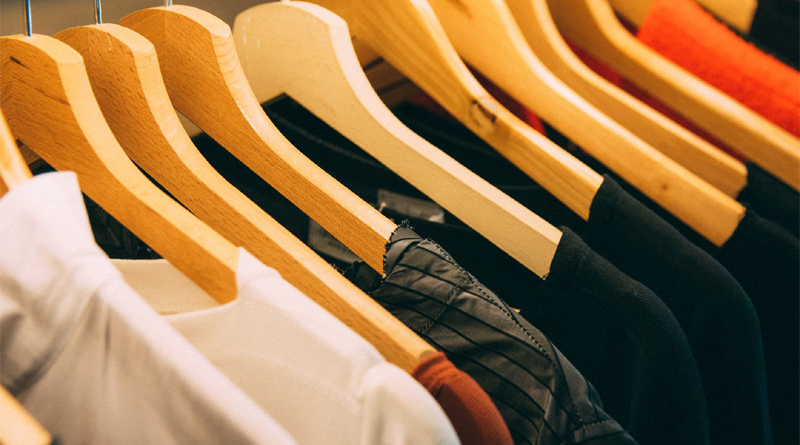CERTIFICATIONS FOR ETHICAL CLOTHING & HOMEWARE
Knowing what standards and certifications you should be looking for in your supply chain isn’t intuitive. For any given aspect of the garment supply chain there can literally be dozens of standards and certifications vying for your attention. To help you understand the basics of what we look for when assessing garment manufacturers, we’ve highlighted some of the main ones to look out for and explained why they exist.
First, let’s define some key terms:
Standards are technical performance benchmarks and frameworks, developed by bodies of experts. There are mandatory (legally required) and voluntary standards; since we’re discussing certifications right now, we’re focused on voluntary standards. Standards exist for every aspect of operations, and vary incredibly in effectiveness and reputation. In general, the most important categories will be (with some overlap); quality management, social responsibility & ethical practices, and environmental management & sustainability. Suppliers adopt a voluntary standard by operating in compliance to the standard’s criteria.
Compliance to a standard does not mean that the supplier has been certified to the standard. While some suppliers may be operating in legitimate compliance, others may simply be claiming to. The problem is; you can’t tell which is which without certification. The certification process can be expensive, or initially difficult to accomplish, and many small-to-medium size suppliers don’t understand the value proposition.
Certification occurs when an accredited independent body (an auditor) verifies that a supplier adheres to the appropriate standard. Upon successful verification, the auditor typically issues a certification statement.
Let’s look at the nine most important certifications for the garment industry:
ISO 9001 (2015)  is one of the most widely used quality management systems created by the largest standards organization in the world, the International Organization for Standardization.
is one of the most widely used quality management systems created by the largest standards organization in the world, the International Organization for Standardization.
For a manufacturer to receive this certification it must demonstrate its ability to consistently produce products that meet customer and regulatory requirements, in addition to an assurance of applying the outlined quality management system in its operations.
As a brand, you know that a manufacturer with an ISO 9001 certification will have a quality management system designed to ensure a great standard of quality for your products.
SA8000 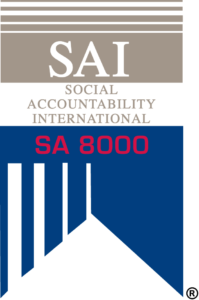 was designed to protect human rights in the workplace through social accountability. This certification enables manufacturers to demonstrate their compliance. Although this is not a consumer-facing label, it is an ideal standard for buyers to look for in apparel and textile manufacturing.
was designed to protect human rights in the workplace through social accountability. This certification enables manufacturers to demonstrate their compliance. Although this is not a consumer-facing label, it is an ideal standard for buyers to look for in apparel and textile manufacturing.
Organizations with an SA8000 certification are audited to encourage them to develop, maintain, and apply socially acceptable practices in the workplace. Brands working with these companies can trust that best practices are being used during the entire production process.
Fair Trade 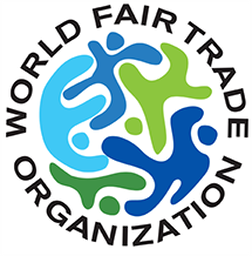 was created by the World Fair Trade Organisation (WFTO), this certifiable standard is dedicated to providing farmers and workers in developing countries with higher wages and improved working conditions.
was created by the World Fair Trade Organisation (WFTO), this certifiable standard is dedicated to providing farmers and workers in developing countries with higher wages and improved working conditions.
For organisations to meet these standards they must demonstrate their willingness to apply fair trade practices across the entire supply chain, not only in their purchasing. If you are a brand that prioritizes ethics and equal opportunity for people in different parts of the world, this certification is a good indication that your manufacturer shares your values as well.
 STANDARD 100 by OEKO-TEX® is a worldwide consistent, independent testing and certification system for raw, semi-finished, and finished textile products at all processing levels. It also includes accessory materials.
STANDARD 100 by OEKO-TEX® is a worldwide consistent, independent testing and certification system for raw, semi-finished, and finished textile products at all processing levels. It also includes accessory materials.
The OEKO-TEX® tests for harmful substances are based on the purpose of the textiles and materials. The more intensive the skin contact of a product and the more sensitive the skin, the stricter the human-ecological requirements that need to be complied with.
This is a great certification to look for if you are making products for users, such as babies, who are likely to have sensitive skin.
Global Organic Textile Standard (GOTS) 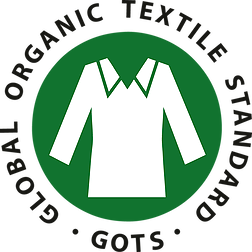 is known for being the world’s most predominant processing standard for testing and verifying organic materials, and is most commonly used with organic cotton. This certification provides a consumer label as well.
is known for being the world’s most predominant processing standard for testing and verifying organic materials, and is most commonly used with organic cotton. This certification provides a consumer label as well.
To be qualified for this certification the textile products being made must be at least 70% organic fibres. There are also strict environmental and toxicological criteria that need to be met. With its advanced social criteria, detailed quality assurance system, and environmental criteria along the entire organic textiles supply chain, there is no doubt that a manufacturer with this certification is dedicated to protecting the environment while producing high-quality organic fabrics.
FLOCERT ![]() is a global certification and verification body for Fair Trade products and assures fairness across global supply chains. In addition to certifying ethical standards for businesses, FLOCERT often gets involved in the process of making businesses more sustainable. If you are a company that wants to be more sustainable but not sure of the right steps to take, you can look to FLOCERT to make recommendations and help design a sustainability plan for your business.
is a global certification and verification body for Fair Trade products and assures fairness across global supply chains. In addition to certifying ethical standards for businesses, FLOCERT often gets involved in the process of making businesses more sustainable. If you are a company that wants to be more sustainable but not sure of the right steps to take, you can look to FLOCERT to make recommendations and help design a sustainability plan for your business.
FLOCERT has worked with organisations all over the world to develop effective sustainability plans, and it monitors the companies throughout the process to ensure that they stay on track towards their goals.
Worldwide Responsible Apparel Production (WRAP) 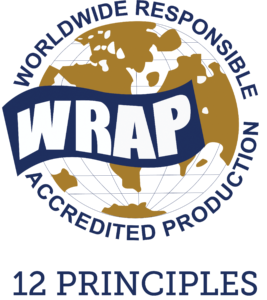 is an independent, objective, non-profit team of global social compliance experts dedicated to promoting safe, lawful, humane and ethical manufacturing around the world through certification and education. WRAP implements the following 12 principles; compliance with local laws, prohibition of forced labour, prohibition of child labour, prohibition of harassment or abuse, compensation and benefits, hours of work, health and safety, prohibition of discrimination, freedom of association, environment, security, and customs compliance.
is an independent, objective, non-profit team of global social compliance experts dedicated to promoting safe, lawful, humane and ethical manufacturing around the world through certification and education. WRAP implements the following 12 principles; compliance with local laws, prohibition of forced labour, prohibition of child labour, prohibition of harassment or abuse, compensation and benefits, hours of work, health and safety, prohibition of discrimination, freedom of association, environment, security, and customs compliance.
Brands who want to ensure that the workers making their products are working in safe conditions should look for WRAP certification. These manufacturers will be following best practices related to the established labour regulations in their country of operation, with the relevant conventions of the International Labour Organization in mind.
Fair Wear Foundation (FWF) 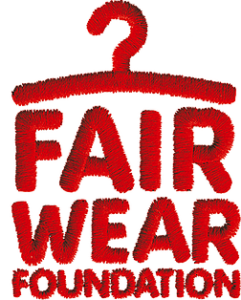 works with brands, factories, trade unions, NGOs and governments to verify and improve workplace conditions. FWF represents over 120 brands, bringing together the key components needed to make a sustainable improvement to workplace conditions.
works with brands, factories, trade unions, NGOs and governments to verify and improve workplace conditions. FWF represents over 120 brands, bringing together the key components needed to make a sustainable improvement to workplace conditions.
Brands should check if their manufacturers are certified by FWF if they prioritize having safe working conditions where their products are made.
FWF keeps track of the efforts made by the companies it certifies, and works to increase the effectiveness of efforts made by companies through sharing expertise, social dialogue and strengthening industrial relations.
BlueSign 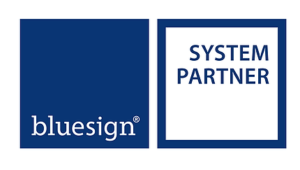 is a certification for the textile industry focusing on legal compliance in relation to environmental health and safety. The certification standard combines aspects of consumer safety, water and air emissions and occupational health, with a particular focus on the reduction of harmful substance usage at early stages of production.
is a certification for the textile industry focusing on legal compliance in relation to environmental health and safety. The certification standard combines aspects of consumer safety, water and air emissions and occupational health, with a particular focus on the reduction of harmful substance usage at early stages of production.
Brands who want their textile products to be sustainably made while also meeting stringent consumer safety requirements should strongly consider working with manufacturers that are certified by BlueSign.
Finally, be sure to verify that the claimed certification is genuine. Most certification bodies keep an up-to-date database of their members on their websites, where you can verify that a company’s certification is genuine.
Inevitably, the challenge that arises with supplier certification will always be verifying that their claimed certifications and operational compliance are genuine
When using an overseas manufacturer it can be challenging to vet them and to ensure that the ethical promises they have made to you are being adhered to. Having a trusted party visit them to check their facility is advisable. However, by only using manufacturers that are certified by a relevant recognised body or bodies is a good first step towards ensuring compliance. Plus, it provides third party validation of your own business’s approach to responsible working practices – which is increasingly important in a world where consumers are becoming more and more socially and environmentally conscious and demanding.
ABOUT THE AUTHOR
Gus Bartholomew is co-founder of Supplycompass, a tech enabled end-to-end production management
platform for responsible brands that want to find and work with the best international manufacturers. It enables brands to find their perfect manufacturing partner at home or overseas.
Brands can create tech packs, get matched with a manufacturer and use the platform to manage production from design to delivery. Supplycompass works with brands and manufacturers to embed responsible and sustainable practises in their businesses and deliver value and create opportunities for growth.
Instagram: @Supplycompass
Facebook: Supplycompass
Twitter: @Supplycompass
LinkedIn: Supplycompass
LinkedIn: Gus Bartholomew

